Treatments and Therapies for Mental Health: Psychodynamic, Somatic, and Behavioural Approaches
VerifiedAdded on 2023/06/08
|6
|1476
|194
AI Summary
This article discusses the importance of mental health and effective approaches for treating mental health conditions. It covers Psychodynamic, Somatic, and Behavioural Approaches, their procedures, aims, advantages, and ethical considerations.
Contribute Materials
Your contribution can guide someone’s learning journey. Share your
documents today.
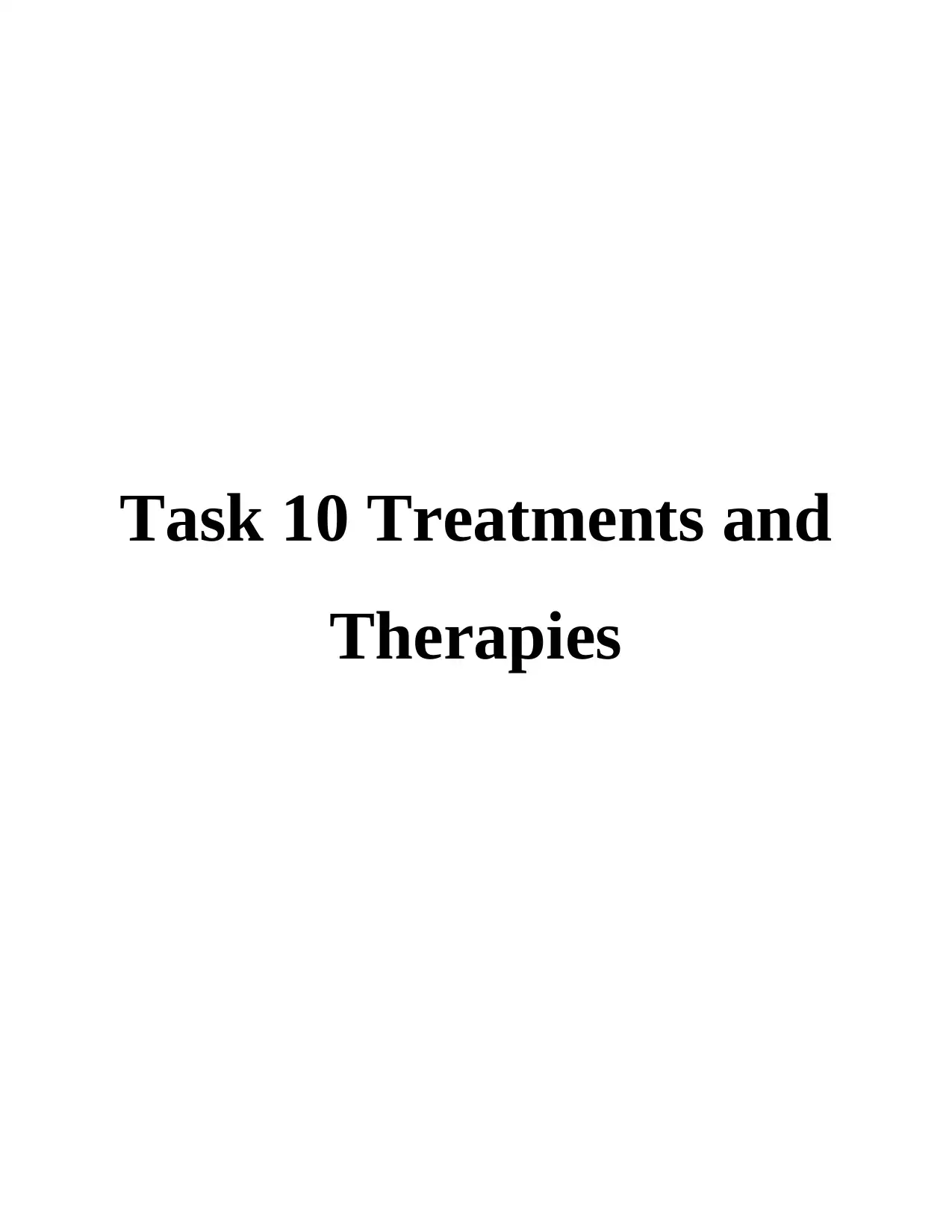
Task 10 Treatments and
Therapies
Therapies
Secure Best Marks with AI Grader
Need help grading? Try our AI Grader for instant feedback on your assignments.
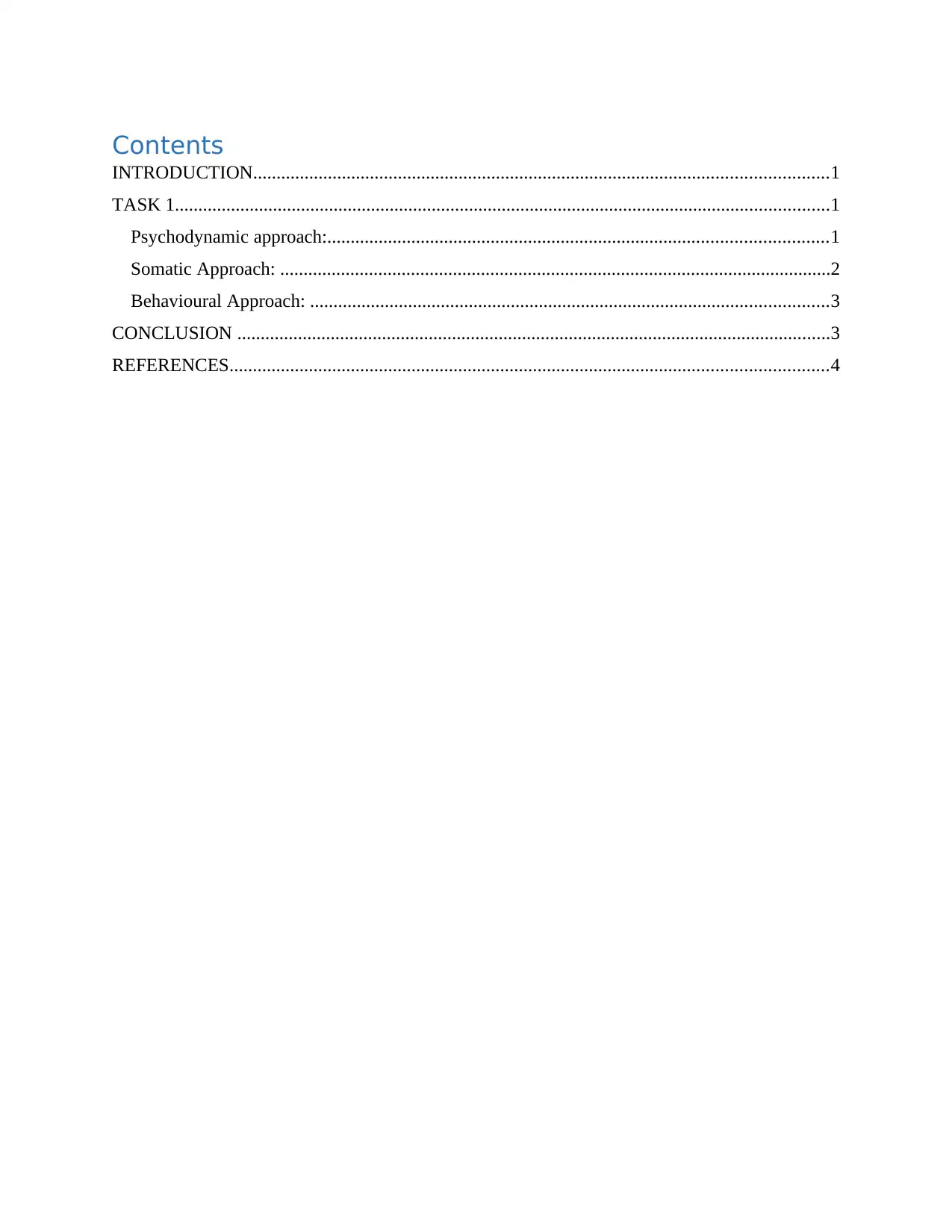
Contents
INTRODUCTION...........................................................................................................................1
TASK 1............................................................................................................................................1
Psychodynamic approach:...........................................................................................................1
Somatic Approach: ......................................................................................................................2
Behavioural Approach: ...............................................................................................................3
CONCLUSION ...............................................................................................................................3
REFERENCES................................................................................................................................4
INTRODUCTION...........................................................................................................................1
TASK 1............................................................................................................................................1
Psychodynamic approach:...........................................................................................................1
Somatic Approach: ......................................................................................................................2
Behavioural Approach: ...............................................................................................................3
CONCLUSION ...............................................................................................................................3
REFERENCES................................................................................................................................4
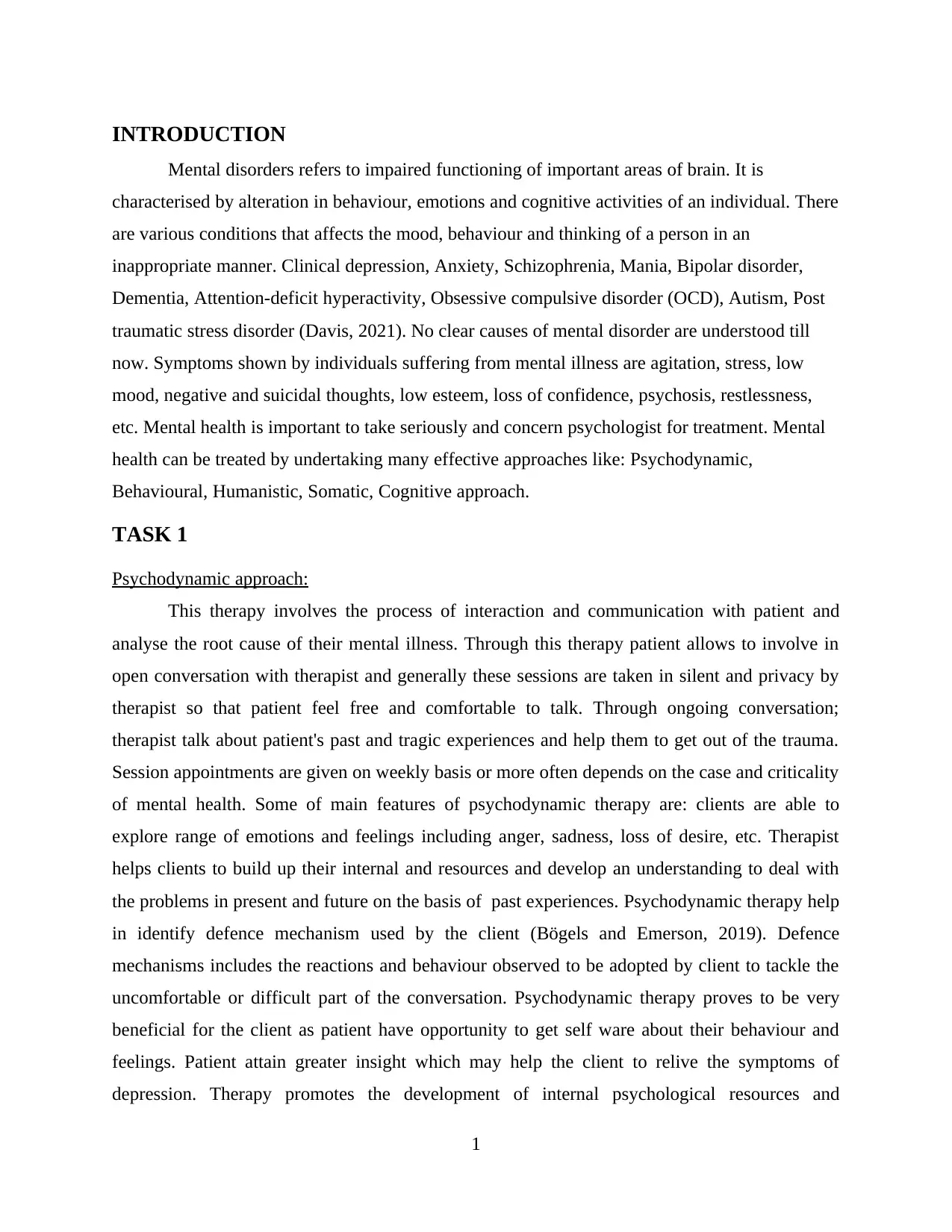
INTRODUCTION
Mental disorders refers to impaired functioning of important areas of brain. It is
characterised by alteration in behaviour, emotions and cognitive activities of an individual. There
are various conditions that affects the mood, behaviour and thinking of a person in an
inappropriate manner. Clinical depression, Anxiety, Schizophrenia, Mania, Bipolar disorder,
Dementia, Attention-deficit hyperactivity, Obsessive compulsive disorder (OCD), Autism, Post
traumatic stress disorder (Davis, 2021). No clear causes of mental disorder are understood till
now. Symptoms shown by individuals suffering from mental illness are agitation, stress, low
mood, negative and suicidal thoughts, low esteem, loss of confidence, psychosis, restlessness,
etc. Mental health is important to take seriously and concern psychologist for treatment. Mental
health can be treated by undertaking many effective approaches like: Psychodynamic,
Behavioural, Humanistic, Somatic, Cognitive approach.
TASK 1
Psychodynamic approach:
This therapy involves the process of interaction and communication with patient and
analyse the root cause of their mental illness. Through this therapy patient allows to involve in
open conversation with therapist and generally these sessions are taken in silent and privacy by
therapist so that patient feel free and comfortable to talk. Through ongoing conversation;
therapist talk about patient's past and tragic experiences and help them to get out of the trauma.
Session appointments are given on weekly basis or more often depends on the case and criticality
of mental health. Some of main features of psychodynamic therapy are: clients are able to
explore range of emotions and feelings including anger, sadness, loss of desire, etc. Therapist
helps clients to build up their internal and resources and develop an understanding to deal with
the problems in present and future on the basis of past experiences. Psychodynamic therapy help
in identify defence mechanism used by the client (Bögels and Emerson, 2019). Defence
mechanisms includes the reactions and behaviour observed to be adopted by client to tackle the
uncomfortable or difficult part of the conversation. Psychodynamic therapy proves to be very
beneficial for the client as patient have opportunity to get self ware about their behaviour and
feelings. Patient attain greater insight which may help the client to relive the symptoms of
depression. Therapy promotes the development of internal psychological resources and
1
Mental disorders refers to impaired functioning of important areas of brain. It is
characterised by alteration in behaviour, emotions and cognitive activities of an individual. There
are various conditions that affects the mood, behaviour and thinking of a person in an
inappropriate manner. Clinical depression, Anxiety, Schizophrenia, Mania, Bipolar disorder,
Dementia, Attention-deficit hyperactivity, Obsessive compulsive disorder (OCD), Autism, Post
traumatic stress disorder (Davis, 2021). No clear causes of mental disorder are understood till
now. Symptoms shown by individuals suffering from mental illness are agitation, stress, low
mood, negative and suicidal thoughts, low esteem, loss of confidence, psychosis, restlessness,
etc. Mental health is important to take seriously and concern psychologist for treatment. Mental
health can be treated by undertaking many effective approaches like: Psychodynamic,
Behavioural, Humanistic, Somatic, Cognitive approach.
TASK 1
Psychodynamic approach:
This therapy involves the process of interaction and communication with patient and
analyse the root cause of their mental illness. Through this therapy patient allows to involve in
open conversation with therapist and generally these sessions are taken in silent and privacy by
therapist so that patient feel free and comfortable to talk. Through ongoing conversation;
therapist talk about patient's past and tragic experiences and help them to get out of the trauma.
Session appointments are given on weekly basis or more often depends on the case and criticality
of mental health. Some of main features of psychodynamic therapy are: clients are able to
explore range of emotions and feelings including anger, sadness, loss of desire, etc. Therapist
helps clients to build up their internal and resources and develop an understanding to deal with
the problems in present and future on the basis of past experiences. Psychodynamic therapy help
in identify defence mechanism used by the client (Bögels and Emerson, 2019). Defence
mechanisms includes the reactions and behaviour observed to be adopted by client to tackle the
uncomfortable or difficult part of the conversation. Psychodynamic therapy proves to be very
beneficial for the client as patient have opportunity to get self ware about their behaviour and
feelings. Patient attain greater insight which may help the client to relive the symptoms of
depression. Therapy promotes the development of internal psychological resources and
1
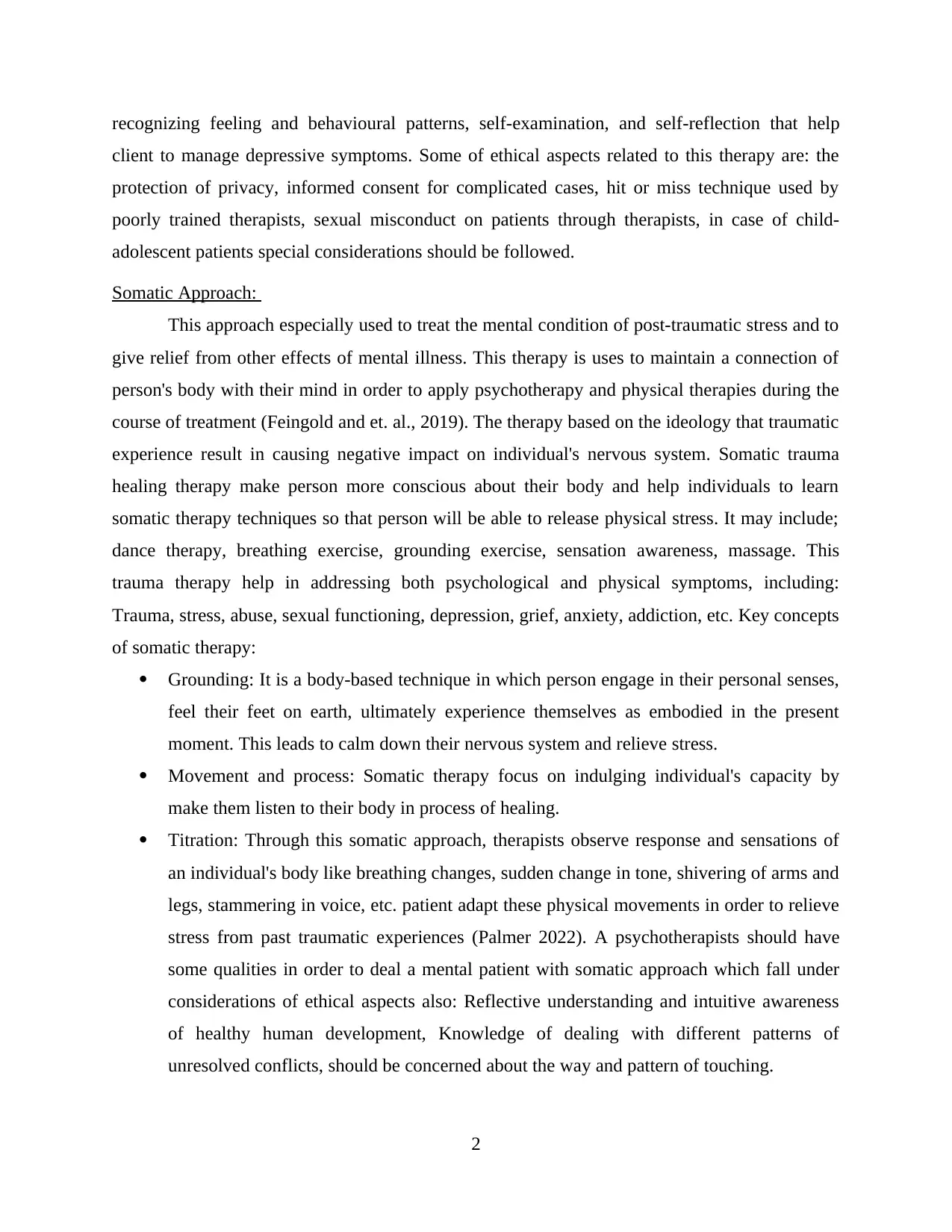
recognizing feeling and behavioural patterns, self-examination, and self-reflection that help
client to manage depressive symptoms. Some of ethical aspects related to this therapy are: the
protection of privacy, informed consent for complicated cases, hit or miss technique used by
poorly trained therapists, sexual misconduct on patients through therapists, in case of child-
adolescent patients special considerations should be followed.
Somatic Approach:
This approach especially used to treat the mental condition of post-traumatic stress and to
give relief from other effects of mental illness. This therapy is uses to maintain a connection of
person's body with their mind in order to apply psychotherapy and physical therapies during the
course of treatment (Feingold and et. al., 2019). The therapy based on the ideology that traumatic
experience result in causing negative impact on individual's nervous system. Somatic trauma
healing therapy make person more conscious about their body and help individuals to learn
somatic therapy techniques so that person will be able to release physical stress. It may include;
dance therapy, breathing exercise, grounding exercise, sensation awareness, massage. This
trauma therapy help in addressing both psychological and physical symptoms, including:
Trauma, stress, abuse, sexual functioning, depression, grief, anxiety, addiction, etc. Key concepts
of somatic therapy:
Grounding: It is a body-based technique in which person engage in their personal senses,
feel their feet on earth, ultimately experience themselves as embodied in the present
moment. This leads to calm down their nervous system and relieve stress.
Movement and process: Somatic therapy focus on indulging individual's capacity by
make them listen to their body in process of healing.
Titration: Through this somatic approach, therapists observe response and sensations of
an individual's body like breathing changes, sudden change in tone, shivering of arms and
legs, stammering in voice, etc. patient adapt these physical movements in order to relieve
stress from past traumatic experiences (Palmer 2022). A psychotherapists should have
some qualities in order to deal a mental patient with somatic approach which fall under
considerations of ethical aspects also: Reflective understanding and intuitive awareness
of healthy human development, Knowledge of dealing with different patterns of
unresolved conflicts, should be concerned about the way and pattern of touching.
2
client to manage depressive symptoms. Some of ethical aspects related to this therapy are: the
protection of privacy, informed consent for complicated cases, hit or miss technique used by
poorly trained therapists, sexual misconduct on patients through therapists, in case of child-
adolescent patients special considerations should be followed.
Somatic Approach:
This approach especially used to treat the mental condition of post-traumatic stress and to
give relief from other effects of mental illness. This therapy is uses to maintain a connection of
person's body with their mind in order to apply psychotherapy and physical therapies during the
course of treatment (Feingold and et. al., 2019). The therapy based on the ideology that traumatic
experience result in causing negative impact on individual's nervous system. Somatic trauma
healing therapy make person more conscious about their body and help individuals to learn
somatic therapy techniques so that person will be able to release physical stress. It may include;
dance therapy, breathing exercise, grounding exercise, sensation awareness, massage. This
trauma therapy help in addressing both psychological and physical symptoms, including:
Trauma, stress, abuse, sexual functioning, depression, grief, anxiety, addiction, etc. Key concepts
of somatic therapy:
Grounding: It is a body-based technique in which person engage in their personal senses,
feel their feet on earth, ultimately experience themselves as embodied in the present
moment. This leads to calm down their nervous system and relieve stress.
Movement and process: Somatic therapy focus on indulging individual's capacity by
make them listen to their body in process of healing.
Titration: Through this somatic approach, therapists observe response and sensations of
an individual's body like breathing changes, sudden change in tone, shivering of arms and
legs, stammering in voice, etc. patient adapt these physical movements in order to relieve
stress from past traumatic experiences (Palmer 2022). A psychotherapists should have
some qualities in order to deal a mental patient with somatic approach which fall under
considerations of ethical aspects also: Reflective understanding and intuitive awareness
of healthy human development, Knowledge of dealing with different patterns of
unresolved conflicts, should be concerned about the way and pattern of touching.
2
Secure Best Marks with AI Grader
Need help grading? Try our AI Grader for instant feedback on your assignments.
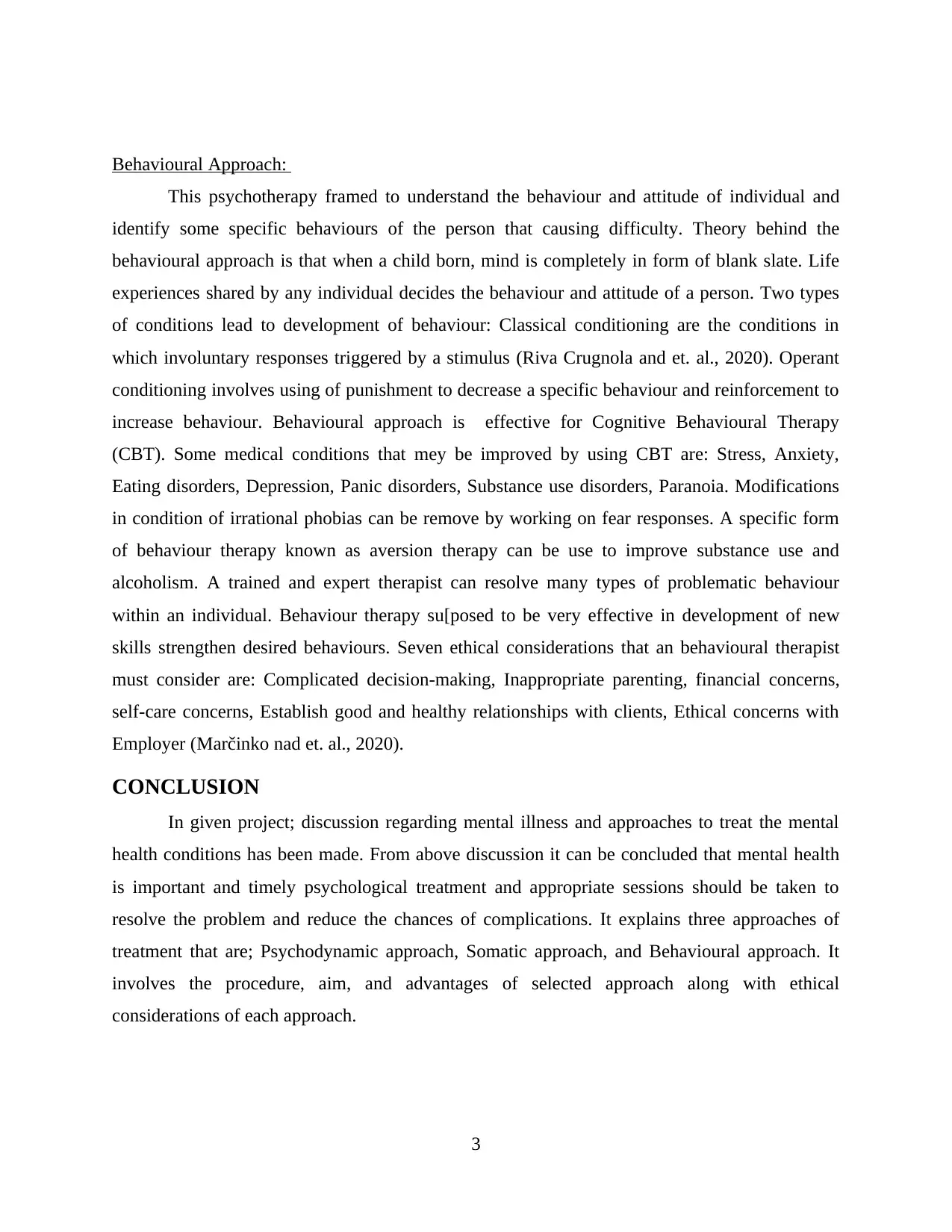
Behavioural Approach:
This psychotherapy framed to understand the behaviour and attitude of individual and
identify some specific behaviours of the person that causing difficulty. Theory behind the
behavioural approach is that when a child born, mind is completely in form of blank slate. Life
experiences shared by any individual decides the behaviour and attitude of a person. Two types
of conditions lead to development of behaviour: Classical conditioning are the conditions in
which involuntary responses triggered by a stimulus (Riva Crugnola and et. al., 2020). Operant
conditioning involves using of punishment to decrease a specific behaviour and reinforcement to
increase behaviour. Behavioural approach is effective for Cognitive Behavioural Therapy
(CBT). Some medical conditions that mey be improved by using CBT are: Stress, Anxiety,
Eating disorders, Depression, Panic disorders, Substance use disorders, Paranoia. Modifications
in condition of irrational phobias can be remove by working on fear responses. A specific form
of behaviour therapy known as aversion therapy can be use to improve substance use and
alcoholism. A trained and expert therapist can resolve many types of problematic behaviour
within an individual. Behaviour therapy su[posed to be very effective in development of new
skills strengthen desired behaviours. Seven ethical considerations that an behavioural therapist
must consider are: Complicated decision-making, Inappropriate parenting, financial concerns,
self-care concerns, Establish good and healthy relationships with clients, Ethical concerns with
Employer (Marčinko nad et. al., 2020).
CONCLUSION
In given project; discussion regarding mental illness and approaches to treat the mental
health conditions has been made. From above discussion it can be concluded that mental health
is important and timely psychological treatment and appropriate sessions should be taken to
resolve the problem and reduce the chances of complications. It explains three approaches of
treatment that are; Psychodynamic approach, Somatic approach, and Behavioural approach. It
involves the procedure, aim, and advantages of selected approach along with ethical
considerations of each approach.
3
This psychotherapy framed to understand the behaviour and attitude of individual and
identify some specific behaviours of the person that causing difficulty. Theory behind the
behavioural approach is that when a child born, mind is completely in form of blank slate. Life
experiences shared by any individual decides the behaviour and attitude of a person. Two types
of conditions lead to development of behaviour: Classical conditioning are the conditions in
which involuntary responses triggered by a stimulus (Riva Crugnola and et. al., 2020). Operant
conditioning involves using of punishment to decrease a specific behaviour and reinforcement to
increase behaviour. Behavioural approach is effective for Cognitive Behavioural Therapy
(CBT). Some medical conditions that mey be improved by using CBT are: Stress, Anxiety,
Eating disorders, Depression, Panic disorders, Substance use disorders, Paranoia. Modifications
in condition of irrational phobias can be remove by working on fear responses. A specific form
of behaviour therapy known as aversion therapy can be use to improve substance use and
alcoholism. A trained and expert therapist can resolve many types of problematic behaviour
within an individual. Behaviour therapy su[posed to be very effective in development of new
skills strengthen desired behaviours. Seven ethical considerations that an behavioural therapist
must consider are: Complicated decision-making, Inappropriate parenting, financial concerns,
self-care concerns, Establish good and healthy relationships with clients, Ethical concerns with
Employer (Marčinko nad et. al., 2020).
CONCLUSION
In given project; discussion regarding mental illness and approaches to treat the mental
health conditions has been made. From above discussion it can be concluded that mental health
is important and timely psychological treatment and appropriate sessions should be taken to
resolve the problem and reduce the chances of complications. It explains three approaches of
treatment that are; Psychodynamic approach, Somatic approach, and Behavioural approach. It
involves the procedure, aim, and advantages of selected approach along with ethical
considerations of each approach.
3
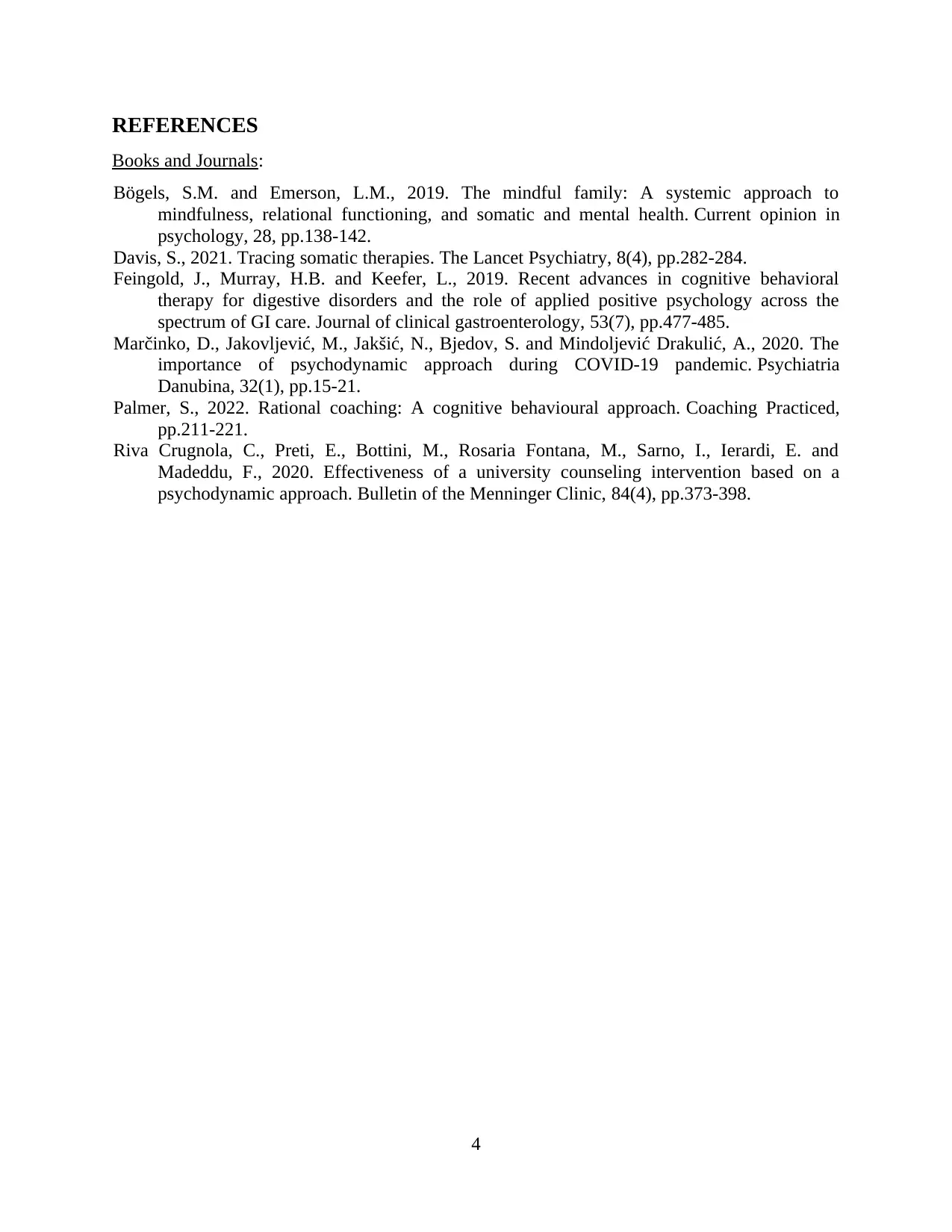
REFERENCES
Books and Journals:
Bögels, S.M. and Emerson, L.M., 2019. The mindful family: A systemic approach to
mindfulness, relational functioning, and somatic and mental health. Current opinion in
psychology, 28, pp.138-142.
Davis, S., 2021. Tracing somatic therapies. The Lancet Psychiatry, 8(4), pp.282-284.
Feingold, J., Murray, H.B. and Keefer, L., 2019. Recent advances in cognitive behavioral
therapy for digestive disorders and the role of applied positive psychology across the
spectrum of GI care. Journal of clinical gastroenterology, 53(7), pp.477-485.
Marčinko, D., Jakovljević, M., Jakšić, N., Bjedov, S. and Mindoljević Drakulić, A., 2020. The
importance of psychodynamic approach during COVID-19 pandemic. Psychiatria
Danubina, 32(1), pp.15-21.
Palmer, S., 2022. Rational coaching: A cognitive behavioural approach. Coaching Practiced,
pp.211-221.
Riva Crugnola, C., Preti, E., Bottini, M., Rosaria Fontana, M., Sarno, I., Ierardi, E. and
Madeddu, F., 2020. Effectiveness of a university counseling intervention based on a
psychodynamic approach. Bulletin of the Menninger Clinic, 84(4), pp.373-398.
4
Books and Journals:
Bögels, S.M. and Emerson, L.M., 2019. The mindful family: A systemic approach to
mindfulness, relational functioning, and somatic and mental health. Current opinion in
psychology, 28, pp.138-142.
Davis, S., 2021. Tracing somatic therapies. The Lancet Psychiatry, 8(4), pp.282-284.
Feingold, J., Murray, H.B. and Keefer, L., 2019. Recent advances in cognitive behavioral
therapy for digestive disorders and the role of applied positive psychology across the
spectrum of GI care. Journal of clinical gastroenterology, 53(7), pp.477-485.
Marčinko, D., Jakovljević, M., Jakšić, N., Bjedov, S. and Mindoljević Drakulić, A., 2020. The
importance of psychodynamic approach during COVID-19 pandemic. Psychiatria
Danubina, 32(1), pp.15-21.
Palmer, S., 2022. Rational coaching: A cognitive behavioural approach. Coaching Practiced,
pp.211-221.
Riva Crugnola, C., Preti, E., Bottini, M., Rosaria Fontana, M., Sarno, I., Ierardi, E. and
Madeddu, F., 2020. Effectiveness of a university counseling intervention based on a
psychodynamic approach. Bulletin of the Menninger Clinic, 84(4), pp.373-398.
4
1 out of 6
Related Documents
Your All-in-One AI-Powered Toolkit for Academic Success.
+13062052269
info@desklib.com
Available 24*7 on WhatsApp / Email
![[object Object]](/_next/static/media/star-bottom.7253800d.svg)
Unlock your academic potential
© 2024 | Zucol Services PVT LTD | All rights reserved.




